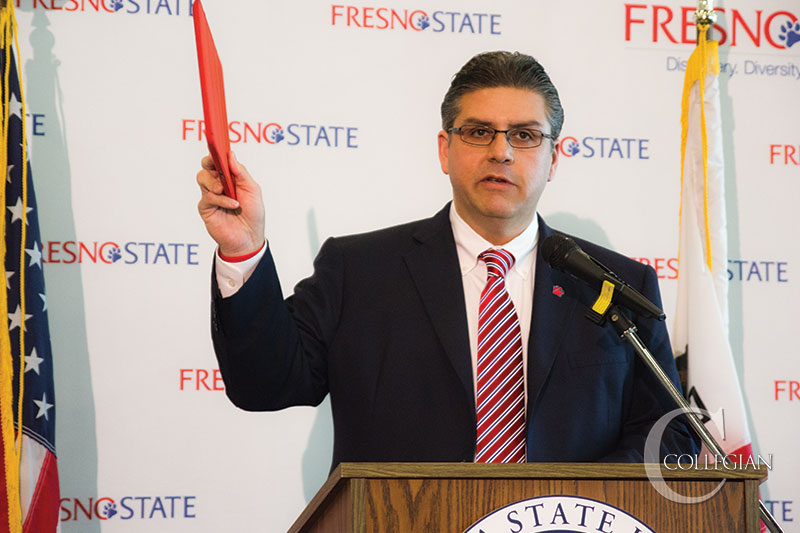
Fresno State President Joseph Castro announced a comprehensive review of all the university’s athletic programs, including the possible return of the men’s wrestling team, during a press conference Friday.
“This review will be done in collaboration with the athletic department and will lead to decisions made next year regarding men’s and women’s athletic teams,” he said. “As part of that review, we will explore the re-establishment of the men’s wrestling team.”
The program was cut in 2006 due to budgeting issues.
If the program were to be revived, Castro said it would take a “significant investment of private funding by those in the community who, like me, would like to see this become a reality.”
The press conference marked his 100th day in office, and, since day one, Castro has made it clear that ensuring students graduate in a timely manner is one of his top commitments for student success.
“We will invest more in programs with proven success in helping our students to graduate in a timely way,” he said.
For Castro, that investment includes the use of tablets, a piece of technology he has consistently since arriving as president.
“To ensure that our students have access to the most valuable tools, we will launch phase one of our tablet initiative in fall 2014, which will serve a cohort of undergraduate and graduate students,” Castro said. “Other students will participate in future years.”
Castro said Interim Provost Andrew Hoff and Associate Provost Lynnette Zelezny will lead the tablet initiative.
Conversations regarding the application of the tablets and their cost, Castro said, began this fall and will continue throughout the implementation process.
“We are still trying to figure out exactly what all the costs will be,” he said.
Included in those costs, Castro said, are the prices of the tablets themselves and investments in preparing faculty and students for the change, which includes hiring additional staff.
Castro said he anticipates that the university will help to offset the cost of the tablets and “make it as easy as possible for them to be used.”
“I also believe that students will need to make some investment,” he said. “It will be shared opportunity, and I think it will be a great payoff for them. Eventually, I believe that it will save money for our students in textbook costs.”
Castro said the university has not yet chosen a tablet company to work with on the initiative.
Zelezny said the tablet initiative would serve students by training them “for the 21st century.”
Because of the Valley’s strong ties to agriculture and Fresno State’s proximity to the industry, Castro announced the establishment of a presidential commission on the future of agriculture.
Castro said the commission will be co-chaired by dairy farmer George Soares of Hanford, Hoff and “leaders from throughout the Valley.”
“The members will assess industry needs and make recommendations to me regarding how Fresno State’s agricultural programs””defined broadly to include science and math, engineering, business and other areas””can be among the very best in the nation and world,” he said.
The commission, Castro said, will share its first report in May.
Castro said an upgrade to the university’s aged electrical infrastructure is also in the works.
“My most urgent non-academic priority is to upgrade our campus infrastructure, much of which has been in place since the 1950s,” he said. “We will invest significantly to upgrade our information technology and electrical infrastructure over the next few years.”
Cynthia Teniente-Matson, Fresno State’s vice president for administration and chief financial officer, said the university would need somewhere around $200 million to address all of its deferred maintenance projects.
“We don’t have that kind of money, so what we’re looking at is our highest priorities for deferred maintenance and for infrastructure repair,” she said. “As President Castro mentioned in his remarks, our highest priority is our electrical and technological infrastructure.”
Matson said the campus is allocated about $500,000 a year for deferred maintenance projects, which she called “a drop in the bucket,” compared with the university’s needs.
Castro said the state’s unstable economy and budget cuts to the California State University system made it difficult to get the project on its feet.
“We’ve just come out of a period where the state has reduced its investment in the university dramatically, so it was much harder to [upgrade the infrastructure] before than it is now,” he said.
Due to record enrollment and “evidence of Fresno State’s continued attractiveness to students and families,” Castro plans to increase enrollment by 800 students starting next year are under way.
“It certainly helps to make the argument for growing our enrollment when the applications to our university are increasing so significantly,” he said.
Matson said the university will request at least $2.5 million from the CSU board of trustees to help support a surge in capacity.
The money, she said, would go toward academic programs and student support services so the campus can meet the increased enrollment.




